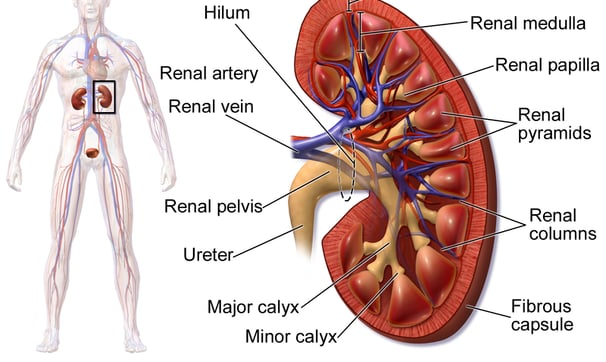Understanding How Kidneys Work and Protective Procedures


The kidneys are vital organs in the human body that play a crucial role in maintaining overall health. Located on either side of the spine, these bean-shaped organs filter waste products and excess fluids from the blood, which are then excreted as urine. Additionally, kidneys help regulate blood pressure, balance electrolytes, and produce hormones necessary for red blood cell production. It is essential to take good care of our kidneys by staying hydrated, maintaining a healthy diet, and avoiding excessive alcohol consumption. Certain medical conditions like kidney stones or infections can impair kidney function, leading to complications. Regular check-ups and seeking medical attention for any kidney-related issues are crucial to ensure optimal kidney health.
In the human body, the kidneys are vital organs responsible for filtering blood and maintaining various aspects of internal balance. These reddish-brown, bean-shaped organs are typically located on the left and right sides within the retroperitoneal space and measure approximately 12 centimeters (about 4+1⁄2 inches) in length. They are supplied with blood through the renal arteries and return filtered blood through the renal veins. Each kidney is connected to a ureter, which transports urine to the bladder.
The primary functions of the kidneys encompass regulating the volume of body fluids, controlling fluid concentration, managing acid-base equilibrium, adjusting electrolyte levels, and eliminating harmful substances. The initial filtration process takes place in the glomerulus, where about one-fifth of the entering blood volume is filtered. The kidneys also engage in reabsorption of essential substances like water, sodium, bicarbonate, glucose, and amino acids, while secreting substances such as hydrogen, ammonium, potassium, and uric acid. The nephron stands as the fundamental structural and functional unit of the kidney, with each adult human kidney housing around 1 million nephrons.
In addition to their role in filtration, the kidneys serve various other functions independent of the nephrons. They are responsible for converting a precursor of vitamin D into its active form, calcitriol, and they produce hormones like erythropoietin and renin.
Chronic kidney disease (CKD) is a significant global health concern, affecting millions of individuals. The estimated global prevalence of CKD is 13.4%, and millions of people with kidney failure require renal replacement therapy. Diagnostic procedures for kidney diseases include urinalysis, assessment of kidney function through the estimated glomerular filtration rate (eGFR) using serum creatinine levels, kidney biopsy, and CT scans to assess kidney anatomy. Dialysis and kidney transplantation are standard treatments for kidney failure, often employed when renal function drops below 15%. Nephrectomy is commonly performed to treat renal cell carcinoma.
Renal physiology is the scientific study of kidney function, while nephrology is the medical field specializing in kidney-related diseases, including CKD, nephritic and nephrotic syndromes, acute kidney injury, and pyelonephritis. Urology, on the other hand, focuses on diseases affecting kidney and urinary tract anatomy, such as cancer, renal cysts, kidney stones, ureteral stones, and urinary tract blockages.
The term "renal" is an adjective that pertains to the kidneys, with its origins in French or late Latin. While there is debate about whether to use "renal" or "kidney" in scientific terminology like "kidney artery," both terms are in use, with "renal" often retained in various contexts, including "renal artery."
Work of the Kidneys: The kidneys are vital organs that perform several essential functions in the body, including:
Filtration: The primary function of the kidneys is to filter waste products, excess salts, and toxins from the blood to form urine. This helps maintain a balance of electrolytes and fluids in the body.
Blood Pressure Regulation: The kidneys play a crucial role in regulating blood pressure by controlling the volume of blood and releasing a hormone called renin when blood pressure drops.
Erythropoiesis Regulation: They produce erythropoietin, a hormone that stimulates the production of red blood cells in response to low oxygen levels in the blood.
Acid-Base Balance: The kidneys help maintain the body's pH balance by excreting hydrogen ions and reabsorbing bicarbonate ions.
Symptoms of Kidney Problems: Kidney problems can manifest through various symptoms, including:
Fatigue: Feeling unusually tired or weak.
Swelling: Swelling in the hands, feet, ankles, or face due to fluid retention.
Changes in Urination: This includes changes in frequency, color, or amount of urine. Blood in the urine (hematuria) can also be a sign.
Pain: Kidney pain is usually felt in the back, near the lower ribs.
High Blood Pressure: Uncontrolled high blood pressure can be a sign of kidney issues.
Nausea and Vomiting: Feeling nauseous and vomiting can result from kidney problems.
Difficulty Breathing: Fluid buildup in the lungs can cause shortness of breath.
Dietary Recommendations for Kidney Care: Maintaining a healthy diet is crucial for kidney health. Here are some dietary tips:
Limit Sodium: Reducing sodium intake helps control blood pressure and fluid balance. Avoid processed foods, canned soups, and excessive salt.
Control Protein: If you have kidney disease, your doctor may recommend limiting protein intake. High-protein diets can strain the kidneys.
Monitor Potassium and Phosphorus: Some kidney patients need to watch their potassium and phosphorus intake. Foods like bananas and dairy products are high in these minerals.
Stay Hydrated: Drink enough water to stay well-hydrated, but don't overdo it.
Limit Sugar and Refined Carbs: Diabetes is a leading cause of kidney disease. Controlling blood sugar is essential.
Eat Healthy Fats: Opt for healthy fats like those found in avocados, nuts, and olive oil.
Consult a Dietitian: If you have kidney disease or specific dietary concerns, consult a registered dietitian for a personalized plan.
Remember that kidney health is essential for overall well-being, and maintaining a balanced diet is a significant step towards caring for your kidneys.
